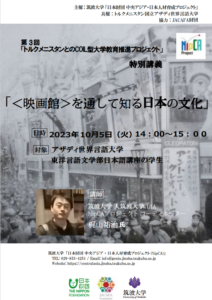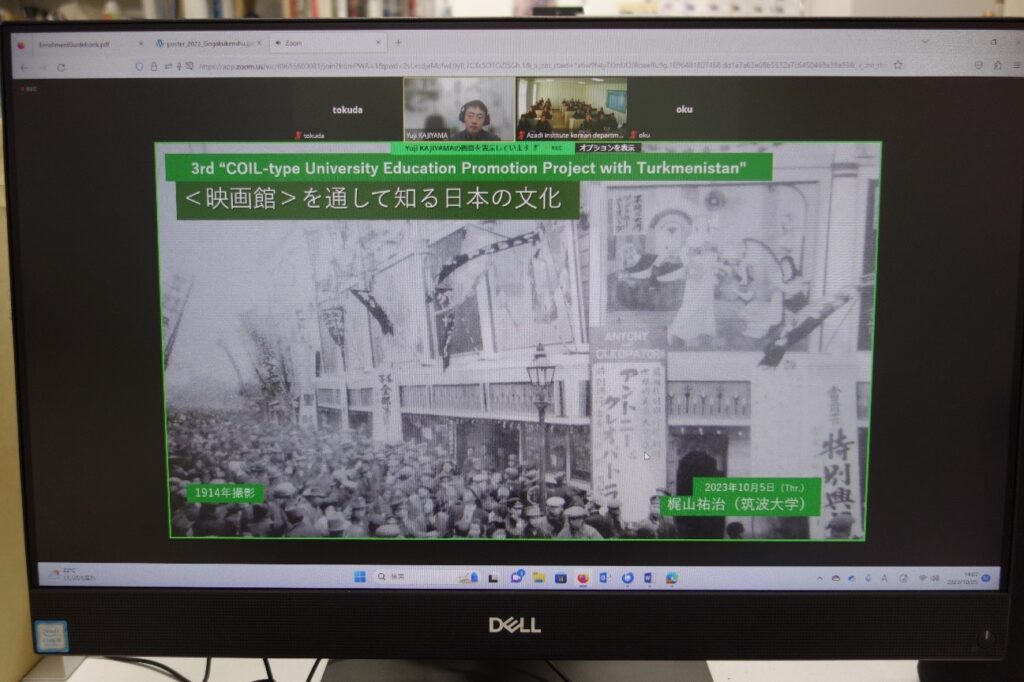On Thursday, October 5, 2023, Dr. Kajiyama Yuji, the NipCA project coordinator, delivered a special lecture titled “Japanese Culture through Cinema” as part of the third “COIL-type University Education Promotion Project with Turkmenistan.” The audience included faculty members from the Japanese language course at the School of Oriental Languages, Azadi University of World Languages, as well as first– through third-year students who participated via Zoom.

The lecture delved into an exploration of Japanese culture, with a focus on cinema rather than film works. Dr. Kajiyama traced the roots of Japanese cinema back to the opening of the first permanent movie theater, Denki Kan, in Asakusa in 1903, which was followed by the establishment of numerous theaters.
Asakusa, historically known for its theaters and drama halls, also housed Asakusa Hanayashiki, Japan’s oldest amusement park, which opened its doors in 1853. Given that cinema was initially perceived more as a form of magic than an art and that it was introduced to Japan by gun merchants and industrialists, Asakusa emerged as the ideal location for the inaugural movie theaters.
The lecture highlighted the era until the early 1930s, during which the role of benshi, or benshi narrators, gained immense popularity. These narrators provided commentary alongside the screen. This period witnessed a significant influx of audiences eager to experience the artistry of these skilled benshi during screenings of Japanese films.
At one point, Asakusa thrived with numerous movie theaters, but since the closure of the last one in 2012 due to aging buildings, the area no longer has any movie theaters. Exploring the history of movies and movie theaters in Japan, spanning over 120 years, provides valuable insights into Japanese culture.
Currently, movie theaters in Japan can be broadly divided into two categories: cinema complexes (multiplexes) and mini-theaters. At first glance, there is a stark contrast between the former, which screens mainly popular and topical films, and the latter, which screens outstanding works that do not fit into the mainstream framework. However, there are also aspects of Japanese film culture that are interrelated, such as films debuting at cinema complexes later being featured at mini-theaters or films that were initially screened at mini-theaters becoming the talk of the town and being widely shown at cinema complexes.
In the second half of the lecture, Dr. Kajiyama delved into the unique culture of mini-theaters showcasing abundant pictures. Some of the older ones include Kawagoe Scala Theater in Saitama Prefecture, whose predecessor was the Yose, which opened in 1905, and Takada Sekai-kan in Niigata Prefecture, which opened in 1911 and now attracts tourists for its historic building.
Tamatsu Totenko in Oita Prefecture and Fukaya Cinema in Saitama Prefecture are examples of mini-theaters created by renovating buildings that were not originally movie theaters. Tamatsu Totenko was a bakery, and Fukaya Cinema was a sake brewery.
The examples of mini-theaters in Hokkaido and Okinawa Prefectures were also interesting. Stone houses are not uncommon in typhoon-prone Okinawa, and the Shuri Theater is unique in its sturdy construction. Unfortunately, this theater closed in 2022. The Daikokuza in Hokkaido, opened in 1911, is now the oldest existing movie theater in the prefecture.
Managing mini-theaters is difficult, and in rural areas, it is not uncommon for a screening to be held without an audience. Some mini-theaters offset the deficit by incorporating other businesses, like dry cleaning, or receiving support from civic groups. It’s crucial to recognize that mini-theaters contribute to cultural promotion in rural areas with dedicated management that fosters audience affection. This is sometimes tied to town revitalization, as in the case of the Takada Sekai-kan, which attracts tourists, and Fukaya Cinema, where one of the movie theaters has become a tourist area. Mini-theaters routinely showcase a diverse array of films addressing social issues in Japan and globally.
During the Q&A session, attendees expressed their impressions of Japanese mini-theaters, a topic they were learning about for the first time. The “COIL-type University Education Promotion Project with Turkmenistan,” featuring online classes at the University of Tsukuba, will continue in the future.




